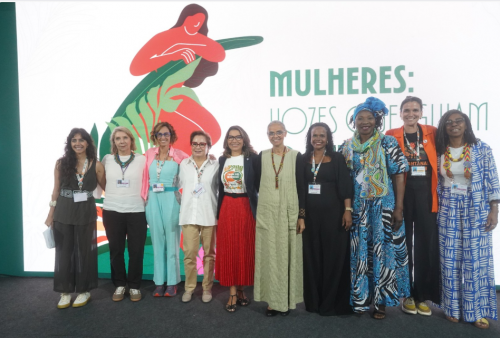
https://cop30.br/en/news-about-cop30/women-led-innovation-and-climate-so...
By Mayara Souto/COP30
The gender agenda took center stage at COP30 this Wednesday, November 19. The session “Women: Voices that Guide the Future,” part of the Action Agenda’s program, highlighted the ways in which women contribute to and lead climate action.
On the occasion, a video was shown presenting the results of the “Voices of the Biomes” project, carried out jointly by COP30’s Special Envoy for Women, Janja Lula da Silva; the Special Envoy for Human Rights and a Just Transition, Denise Dora; and the Special Envoy for Racial Equality, Jurema Werneck. Throughout the year, they visited Brazil’s five biomes to learn about sustainable solutions developed by women.
“In each place, I met dozens of women who are on the front lines of climate change. Family farmers, quilombola women, Indigenous women, riverside dwellers, researchers, community leaders, public managers, and women entrepreneurs who, even while facing loss, scarcity, violence, and inequality, continue creating solutions to protect life, secure rights, and keep alive the conditions that sustain their communities,” said Janja Lula da Silva.
Juremas Werneck, who is also a physician and the executive director of Amnesty International Brazil, highlighted the urgent demand for climate action observed across local territories. “Women in different territories are saying that the crisis must be understood as an emergency. And the response must be infused with this urgent call to save all lives, save all biomes, save the very existence and the cultures that thrive there. We saw fire on wet land, we saw drought on flooded land, we saw hunger where there once was abundance. But we also saw the determination of women to rebuild life,” she stated.
Experience
Denise Dora, a human rights lawyer and feminist activist from the Brazilian state of Rio Grande do Sul, said the devastating floods in the state made clear the importance of bringing local experiences into the COP30 debate.
“Last year, I lived through the experience of seeing an entire state flooded, with a huge number of people losing their homes, their memories, their letters, their books. I closely followed, in particular, the experiences of women in this challenging reconstruction process. The experience of going to shelters, for example, and then facing sexual violence and discrimination in access to food,” recalled the Special Envoy for Human Rights and a Just Transition. “So, naturally, listening to how women across the different Brazilian biomes were experiencing these crises and emergencies — how they were resisting them and how they sought solutions to confront them — was, in our view, the most important message we could bring to COP30,” she added.
Brazil’s Minister of the Environment and Climate Change, Marina Silva, highlighted the ancestral culture of women cooperating to confront adverse situations. “Women know how to share the theory of things. Women know how to share execution. And women like to share recognition. There is a Cartesian notion that everything belongs to the leader. But the world needs to learn how to share. And that is what we are doing here so that we may have a prosperous, diverse, and sustainable world,” she said.
Gender Action Plan
During the meeting, the Gender Action Plan was also discussed; it is currently under negotiation at COP30. The document updates the Enhanced Lima Work Programme on Gender, approved in 2014 at COP20.
Ambassador Vanessa Dolce, Brazil’s High Representative for Gender at the Ministry of Foreign Affairs, detailed how the debate on the Plan is unfolding at the negotiating table.
“We began ministerial consultations last night. The Brazilian presidency of the COP designated two countries to lead the discussion on gender: Sweden and Chile, whose ministers are spearheading conversations with heads of delegation and negotiating groups,” she said. “We have a political and negotiating intent that gender not remain isolated in a single negotiating room. As long as gender is reduced to, and isolated in, a specific negotiation room, climate action will not be effective,” added Ambassador Dolce.
Mexico’s Ambassador Patricia Espinosa, who also serves as COP30’s Special Envoy for Latin America and the Caribbean, noted that progress on gender issues in the international debate is being achieved, despite the slow pace. “The Adaptation Fund, for example, created a mechanism to support very small, community-based projects. And these projects are often led by women. So I believe we are making progress, but the fight must continue both at the negotiation level and at the national level,” the Ambassador said.
Brazil’s First Lady Janja Lula summed it up: “The gender issue can no longer be an annex to the decisions made here at COP. Let this be a moment that moves us — a moment that awakens hope, but also responsibility. Because every step we take in climate action is a step toward women living with greater dignity. Every advancement in gender equality brings us closer to a world capable of overcoming the climate crisis.”
Also present at the event were Cecile Ndjebet, an environmental activist from Cameroon; Luciana Leite, co-founder of Chalana Esperança; and Elida Nascimento Monteiro, a leader in the quilombola organization Malungu, who comes from the Itacoã quilombo in Belém.









